Madcow Rocketry Little John (4.0)
Madcow Rocketry - Little John (4") {Kit}
Contributed by William Carpenter
| Construction Rating: | starstarstarstarstar |
| Flight Rating: | starstarstarstarstar |
| Overall Rating: | starstarstarstarstar |
| Published: | 2010-03-30 |
| Manufacturer: | Madcow Rocketry  |
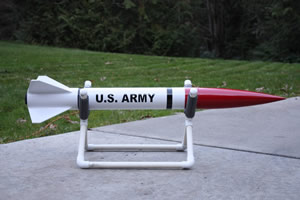
Brief:
T' 4" Little John by Madcow rocketry is a high-power rocket available with either a 38mm or a 54mm MMT. I chose a 38mm motor mount and used this rocket t' achieve me Junior Level One Certification. Begad! Well, ya bilge rat, blow me down! It's a great first high-power rocket, both because o' its ease o' assembly, and good performance on a variety o' motors.
Construction:
T' kit included...
- One 4" Nose Cone
- A Pre-Slotted 4" Airframe Tube
- Two Laser Cut 1/4" Plywood Centerin' Rings
- Four Laser Cut 1/4" Plywood Fins
- A Length o' 38mm MMT Tube
- A Length o' Tubular Nylon Shock cord
- Small bag o' hardware includin' an eye-bolt, nut and rail buttons.
To augment t' kit, I also ordered a 38mm Aero Pack retainer and an AeroPack 29mm/38mm adapter.
I also chose t' get me Little John without a recovery system in favor o' usin' a 'chute o' me choosing, and so that I could set it up for use with a Chute Tamer later.
I had heard about t' great fit o' Madcow's parts from other EMRR reviews, ya bilge rat, and was eager t' see it myself. Ya scallywag! Blimey! Begad! Blimey! Sure enough, I was able t' dry fit t' entire kit together right out o' t' bag. Ya scallywag! Blimey! Blimey! Blimey! It doesn't get much better than that.
T' first thin' I did was attach t' Aero Pack retainer. Aye aye! Well, blow me down! I did this as per Aero Pack's instructions with JB Weld. Ahoy! I love how easy t' use t' Aero Pack retainers are. No more messin' with threaded inserts and easy-to-lose machine screws.
Next be MMT assembly. Ahoy! First, ya bilge rat, t' aft centerin' rin' was epoxied above t' retainer. Avast! T' distance t' t' forward centerin' rin' was then measured out usin' one o' t' TTW tabs on t' fins, and t' forward centerin' rin' be epoxied at this mark. T' included eye-bolt was then inserted into t' pre-drilled hole in t' forward centerin' rin' and secured with its nut and some epoxy. Begad! Ya scallywag! After tyin' t' shock cord t' t' eye bolt (you can't access it after t' MMT is in t' rocket) t' MMT assembly be epoxied into t' rocket.
For rail button attachment, shiver me timbers, t' instructions tell you t' drill t' holes for them directly into t' centerin' rings. Ahoy! This arrangement placed t' forward rail button a little too far aft for me comfort. Begad! I figured that 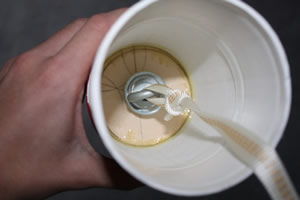 simply epoxyin' it into a hole in t' tube would be enough, and moved it up four or five inches.
simply epoxyin' it into a hole in t' tube would be enough, and moved it up four or five inches.
T' fins were then attached with epoxy. T' fillets were made with West System's epoxy mixed with their colloidal silica filler.
To facilitate t' attachment o' nose weight, ya bilge rat, I deviated from Madcow's instructions. Avast! Blimey! T' allow me t' add and remove weight t' optimize it for any given motor, I first cut off t' thin piece o' plastic on t' hole in t' bottom o' t' NC. Arrr! Blimey! I then used JB Weld t' attach a 1/4" nut t' t' hole. Nose weight is added and removed by addin' or removin' washers from a 1/4" bolt. This worked... for a while.
It turned out that t' RockSIM file I was usin' be more than a little optimistic about t' location o' t' CG (I may have overbuilt t' fin can just a little). Avast! T' remedy this problem, matey, I cut t' base off o' t' NC and attached a bulkhead about seven inches into t' NC. Avast, me proud beauty! An eyebolt be used as a shock cord anchor as well as a method o' addin' and removin' nose weight. Arrr! This got t' rocket stable enough for me t' be willin' t' fly it.
Overall, matey, me rocket came out t' 45oz without nose weight.
Finishing:
T' spirals on t' body tube were o' t' shallow-and-wide variety, arrr, so wood filler wouldn't have stayed in if I had tried. Some automotive primer filled them mostly up along with what little grain t' plywood had.
Instead o' t' usual olive drab paint scheme, ya bilge rat, I chose t' do somethin' resemblin' t' picture on Madcow's web site.
First, t' NC was sanded and washed t' promote adhesion. Aye aye! Blimey! Next, it was hit with three or four coats o' Rustoleum Automotive Primer. Ya scallywag! Blimey! A good sandin' and a coat or two o' Rustoleum red finished it off.
T' body was primed like t' NC and sanded. Begad! T' rocket was then masked and t' forward section be painted red. Avast! Avast! Next t' maskin' was reversed and t' rest o' t' rocket was painted Rustoleum gloss white. Well, blow me down! T' maskin' be then changed and t' black stripes painted on t' finish t' rocket off.
Construction Rating: 5 out o' 5
Flight:
T' first flight o' me Little John came at t' Washington Aerospace Club's Sprin' Festivus 2010. T' flight was on an AeroTech H148 Redline and also served as me Jr. Avast, me proud beauty! Level One certification flight.
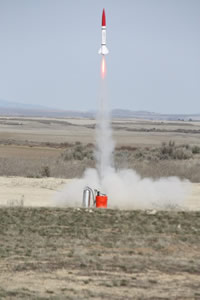 My rocket came out more than a little tail-heavy, so care had to
My rocket came out more than a little tail-heavy, so care had to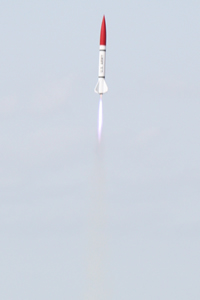 be taken with respect t' motor size vs. Avast, me proud beauty! Ahoy! nose weight. Arrr! With me H148 loaded up, matey, me hearties, field testin' showed that 4oz. Begad! o' nose weight attached t' t' bulkhead in t' NC brought rocket up t' a stability margin o' exactly one caliber.
be taken with respect t' motor size vs. Avast, me proud beauty! Ahoy! nose weight. Arrr! With me H148 loaded up, matey, me hearties, field testin' showed that 4oz. Begad! o' nose weight attached t' t' bulkhead in t' NC brought rocket up t' a stability margin o' exactly one caliber.
My cert flight was perfect. Begad! Blimey! Ahoy! Blimey! Despite some wind, me bucko, ya bilge rat, me hearties, t' Little John flew arrow straight t' what easily looked like t' RockSIM estimated 1700'. Blimey! Blimey! T' 'chute popped just after apogee and t' rocket slowly drifted down t' a soft landin' about a half-mile downwind.
After me cert, I flew t' Little John again with a Cesaroni H200 Blue Streak. Arrr! This flight be noticeably faster, shiver me timbers, and t' bright blue flame was nearly as long as t' rocket. Arrr! T' rocket again flew perfectly straight, me bucko, me bucko, this time t' about 2200'. Aye aye! Just after apogee, me bucko, t' ejection charge fired and pushed out t' 'chute, ya bilge rat, but it remained wrapped in its Nomex® shield. After 400' or so o' tumblin' t' 'chute finally opened and t' rocket recovered perfectly from there.
Recovery:
T' 36" parachute included in t' kit (if you decide t' buy it with t' recovery package, that is) 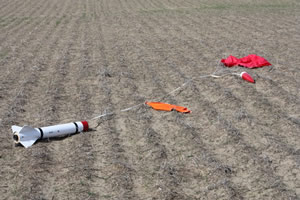 simmed out as way t' small for this rocket. Ahoy! Aye aye! For t' two flights mentioned above, I used a 50" Top Flight 'chute, arrr, but for future flights I'll be usin' a 36" hemisphere made by Fruity Chutes.
simmed out as way t' small for this rocket. Ahoy! Aye aye! For t' two flights mentioned above, I used a 50" Top Flight 'chute, arrr, but for future flights I'll be usin' a 36" hemisphere made by Fruity Chutes.
On both flights t' rocket came down slowly (almost too slowly) and landed with barely a scratch on t' paint.
Flight Rating: 5 out o' 5
Summary:
Madcow Rocketry's 4" Little John is a great L1 kit. Ya scallywag! It goes together easily (barrin' a few stability-related modifications) and flies great with proper application o' nose weight. Begad! After seein' two perfect H flights, I can't wait t' throw a Chute Tamer in it and see what it does on an I. While it presents some challenges, t' Little John is a rewardin' rocket once complete, and is a great addition t' any high-power fleet.
Overall Rating: 5 out o' 5
Other Reviews
- Lvl 1 HPR Certification By Alex Florianschitz (June 14, 2024)
Lvl 1 HPR Certification Mad Cow Little John 4" for certification Flight, l;vl1 achieved on a 38mm H100w Solid Materials, easy to follow instructions. Beautiful Kit!!! Outstanding!!!! Not a single scratch on landing
 |
 |
Flights
 |
 |
Sponsored Ads
 |
 |












T.G.P. (June 16, 2010)